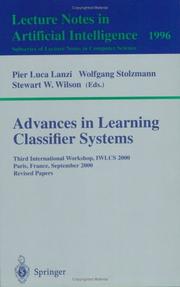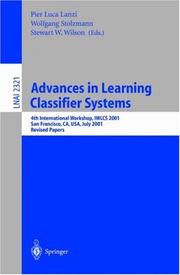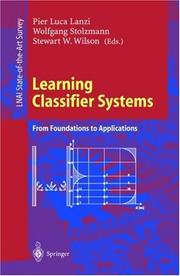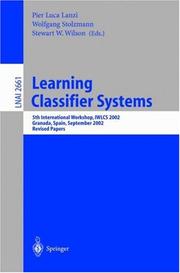| Listing 1 - 7 of 7 |
Sort by
|

ISBN: 3540446400 3540424377 Year: 2001 Publisher: Berlin, Heidelberg : Springer Berlin Heidelberg : Imprint: Springer,
Abstract | Keywords | Export | Availability | Bookmark
 Loading...
Loading...Choose an application
- Reference Manager
- EndNote
- RefWorks (Direct export to RefWorks)
Learning classi er systems are rule-based systems that exploit evolutionary c- putation and reinforcement learning to solve di cult problems. They were - troduced in 1978 by John H. Holland, the father of genetic algorithms, and since then they have been applied to domains as diverse as autonomous robotics, trading agents, and data mining. At the Second International Workshop on Learning Classi er Systems (IWLCS 99), held July 13, 1999, in Orlando, Florida, active researchers reported on the then current state of learning classi er system research and highlighted some of the most promising research directions. The most interesting contri- tions to the meeting are included in the book Learning Classi er Systems: From Foundations to Applications, published as LNAI 1813 by Springer-Verlag. The following year, the Third International Workshop on Learning Classi er Systems (IWLCS 2000), held September 15{16 in Paris, gave participants the opportunity to discuss further advances in learning classi er systems. We have included in this volume revised and extended versions of thirteen of the papers presented at the workshop.
Machine learning --- Computer Science --- Engineering & Applied Sciences --- Computer science. --- Computers. --- Mathematical logic. --- Artificial intelligence. --- Computer Science. --- Artificial Intelligence (incl. Robotics). --- Theory of Computation. --- Mathematical Logic and Formal Languages. --- Computation by Abstract Devices. --- Information theory. --- Artificial Intelligence. --- AI (Artificial intelligence) --- Artificial thinking --- Electronic brains --- Intellectronics --- Intelligence, Artificial --- Intelligent machines --- Machine intelligence --- Thinking, Artificial --- Bionics --- Cognitive science --- Digital computer simulation --- Electronic data processing --- Logic machines --- Machine theory --- Self-organizing systems --- Simulation methods --- Fifth generation computers --- Neural computers --- Algebra of logic --- Logic, Universal --- Mathematical logic --- Symbolic and mathematical logic --- Symbolic logic --- Mathematics --- Algebra, Abstract --- Metamathematics --- Set theory --- Syllogism --- Automatic computers --- Automatic data processors --- Computer hardware --- Computing machines (Computers) --- Electronic calculating-machines --- Electronic computers --- Hardware, Computer --- Computer systems --- Cybernetics --- Calculators --- Cyberspace

ISBN: 3540437932 3540481044 Year: 2002 Publisher: Berlin, Germany ; New York, New York : Springer,
Abstract | Keywords | Export | Availability | Bookmark
 Loading...
Loading...Choose an application
- Reference Manager
- EndNote
- RefWorks (Direct export to RefWorks)
Machine learning --- Computer Science --- Engineering & Applied Sciences --- Computer science. --- Science. --- Computers. --- Mathematical logic. --- Artificial intelligence. --- Computer Science. --- Artificial Intelligence (incl. Robotics). --- Science, general. --- Mathematical Logic and Formal Languages. --- Computation by Abstract Devices. --- AI (Artificial intelligence) --- Artificial thinking --- Electronic brains --- Intellectronics --- Intelligence, Artificial --- Intelligent machines --- Machine intelligence --- Thinking, Artificial --- Bionics --- Cognitive science --- Digital computer simulation --- Electronic data processing --- Logic machines --- Machine theory --- Self-organizing systems --- Simulation methods --- Fifth generation computers --- Neural computers --- Algebra of logic --- Logic, Universal --- Mathematical logic --- Symbolic and mathematical logic --- Symbolic logic --- Mathematics --- Algebra, Abstract --- Metamathematics --- Set theory --- Syllogism --- Automatic computers --- Automatic data processors --- Computer hardware --- Computing machines (Computers) --- Electronic calculating-machines --- Electronic computers --- Hardware, Computer --- Computer systems --- Cybernetics --- Calculators --- Cyberspace --- Natural science --- Science of science --- Sciences --- Informatics --- Science --- Artificial Intelligence. --- Science, Humanities and Social Sciences, multidisciplinary.

ISSN: 03029743 ISBN: 3540677291 9783540677291 3540450270 Year: 2000 Volume: 1813 Publisher: Berlin, Heidelberg : Springer Berlin Heidelberg : Imprint: Springer,
Abstract | Keywords | Export | Availability | Bookmark
 Loading...
Loading...Choose an application
- Reference Manager
- EndNote
- RefWorks (Direct export to RefWorks)
Learning Classifier Systems (LCS) are a machine learning paradigm introduced by John Holland in 1976. They are rule-based systems in which learning is viewed as a process of ongoing adaptation to a partially unknown environment through genetic algorithms and temporal difference learning. This book provides a unique survey of the current state of the art of LCS and highlights some of the most promising research directions. The first part presents various views of leading people on what learning classifier systems are. The second part is devoted to advanced topics of current interest, including alternative representations, methods for evaluating rule utility, and extensions to existing classifier system models. The final part is dedicated to promising applications in areas like data mining, medical data analysis, economic trading agents, aircraft maneuvering, and autonomous robotics. An appendix comprising 467 entries provides a comprehensive LCS bibliography.
Machine learning --- Computer Science --- Engineering & Applied Sciences --- Machine Learning --- Machine learning. --- Learning, Machine --- Computer science. --- Computers. --- Mathematical logic. --- Artificial intelligence. --- Computer Science. --- Artificial Intelligence (incl. Robotics). --- Mathematical Logic and Formal Languages. --- Computation by Abstract Devices. --- AI (Artificial intelligence) --- Artificial thinking --- Electronic brains --- Intellectronics --- Intelligence, Artificial --- Intelligent machines --- Machine intelligence --- Thinking, Artificial --- Bionics --- Cognitive science --- Digital computer simulation --- Electronic data processing --- Logic machines --- Machine theory --- Self-organizing systems --- Simulation methods --- Fifth generation computers --- Neural computers --- Algebra of logic --- Logic, Universal --- Mathematical logic --- Symbolic and mathematical logic --- Symbolic logic --- Mathematics --- Algebra, Abstract --- Metamathematics --- Set theory --- Syllogism --- Automatic computers --- Automatic data processors --- Computer hardware --- Computing machines (Computers) --- Electronic calculating-machines --- Electronic computers --- Hardware, Computer --- Computer systems --- Cybernetics --- Calculators --- Cyberspace --- Informatics --- Science --- Artificial intelligence --- Artificial Intelligence.

ISBN: 3540205446 354040029X Year: 2003 Publisher: Berlin, Heidelberg : Springer Berlin Heidelberg : Imprint: Springer,
Abstract | Keywords | Export | Availability | Bookmark
 Loading...
Loading...Choose an application
- Reference Manager
- EndNote
- RefWorks (Direct export to RefWorks)
The 5th International Workshop on Learning Classi?er Systems (IWLCS2002) was held September 7–8, 2002, in Granada, Spain, during the 7th International Conference on Parallel Problem Solving from Nature (PPSN VII). We have included in this volume revised and extended versions of the papers presented at the workshop. In the ?rst paper, Browne introduces a new model of learning classi?er system, iLCS, and tests it on the Wisconsin Breast Cancer classi?cation problem. Dixon et al. present an algorithm for reducing the solutions evolved by the classi?er system XCS, so as to produce a small set of readily understandable rules. Enee and Barbaroux take a close look at Pittsburgh-style classi?er systems, focusing on the multi-agent problem known as El-farol. Holmes and Bilker investigate the effect that various types of missing data have on the classi?cation performance of learning classi?er systems. The two papers by Kovacs deal with an important theoretical issue in learning classi?er systems: the use of accuracy-based ?tness as opposed to the more traditional strength-based ?tness. In the ?rst paper, Kovacs introduces a strength-based version of XCS, called SB-XCS. The original XCS and the new SB-XCS are compared in the second paper, where - vacs discusses the different classes of solutions that XCS and SB-XCS tend to evolve.
Machine learning --- Computer science. --- Computers. --- Mathematical logic. --- Database management. --- Artificial intelligence. --- Computer Science. --- Artificial Intelligence (incl. Robotics). --- Computation by Abstract Devices. --- Mathematical Logic and Formal Languages. --- Database Management. --- AI (Artificial intelligence) --- Artificial thinking --- Electronic brains --- Intellectronics --- Intelligence, Artificial --- Intelligent machines --- Machine intelligence --- Thinking, Artificial --- Bionics --- Cognitive science --- Digital computer simulation --- Electronic data processing --- Logic machines --- Machine theory --- Self-organizing systems --- Simulation methods --- Fifth generation computers --- Neural computers --- Data base management --- Data services (Database management) --- Database management services --- DBMS (Computer science) --- Generalized data management systems --- Services, Database management --- Systems, Database management --- Systems, Generalized database management --- Algebra of logic --- Logic, Universal --- Mathematical logic --- Symbolic and mathematical logic --- Symbolic logic --- Mathematics --- Algebra, Abstract --- Metamathematics --- Set theory --- Syllogism --- Automatic computers --- Automatic data processors --- Computer hardware --- Computing machines (Computers) --- Electronic calculating-machines --- Electronic computers --- Hardware, Computer --- Computer systems --- Cybernetics --- Calculators --- Cyberspace --- Informatics --- Science --- Artificial Intelligence.
Digital
ISBN: 9783540481041 Year: 2006 Publisher: Berlin, Heidelberg Springer-Verlag Berlin Heidelberg
Abstract | Keywords | Export | Availability | Bookmark
 Loading...
Loading...Choose an application
- Reference Manager
- EndNote
- RefWorks (Direct export to RefWorks)
Mathematical logic --- Computer science --- Artificial intelligence. Robotics. Simulation. Graphics --- informatica --- wiskunde --- KI (kunstmatige intelligentie) --- logica --- robots
Digital

ISBN: 9783540712312 Year: 2007 Publisher: Berlin, Heidelberg Springer-Verlag Berlin Heidelberg
Abstract | Keywords | Export | Availability | Bookmark
 Loading...
Loading...Choose an application
- Reference Manager
- EndNote
- RefWorks (Direct export to RefWorks)
Mathematical logic --- Computer science --- Information systems --- Artificial intelligence. Robotics. Simulation. Graphics --- informatica --- database management --- wiskunde --- logica --- robots
Book

ISBN: 9783540712312 Year: 2007 Publisher: Berlin, Heidelberg Springer-Verlag Berlin Heidelberg
Abstract | Keywords | Export | Availability | Bookmark
 Loading...
Loading...Choose an application
- Reference Manager
- EndNote
- RefWorks (Direct export to RefWorks)
The work embodied in this volume was presented across three consecutive e- tions of the International Workshop on Learning Classi?er Systems that took place in Chicago (2003), Seattle (2004), and Washington (2005). The Genetic and Evolutionary Computation Conference, the main ACM SIGEvo conference, hosted these three editions. The topics presented in this volume summarize the wide spectrum of interests of the Learning Classi?er Systems (LCS) community. The topics range from theoretical analysis of mechanisms to practical cons- eration for successful application of such techniques to everyday data-mining tasks. When we started editing this volume, we faced the choice of organizing the contents in a purely chronologicalfashion or as a sequence of related topics that help walk the reader across the di?erent areas. In the end we decided to or- nize the contents by area, breaking the time-line a little. This is not a simple endeavor as we can organize the material using multiple criteria. The tax- omy below is our humble e?ort to provide a coherent grouping. Needless to say, some works may fall in more than one category. The four areas are as follows: Knowledge representation. These chapters elaborate on the knowledge r- resentations used in LCS. Knowledge representation is a key issue in any learning system and has implications for what it is possible to learn and what mechanisms shouldbe used. Four chapters analyze di?erent knowledge representations and the LCS methods used to manipulate them.
Mathematical logic --- Computer science --- Information systems --- Artificial intelligence. Robotics. Simulation. Graphics --- informatica --- database management --- wiskunde --- logica --- robots
| Listing 1 - 7 of 7 |
Sort by
|

 Search
Search Feedback
Feedback About UniCat
About UniCat  Help
Help News
News